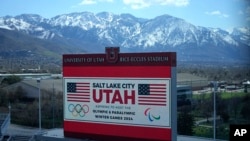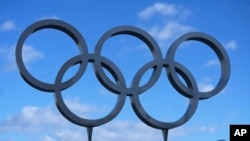The International Olympic Committee on Wednesday enthusiastically supported the decades-long effort to host the Winter Olympics in Utah’s capital in 2034.
Unlike many other past host countries that decided rehosting the Games wasn’t worth the time, money or trouble, Salt Lake City remains one of the few places where Olympic fever remains high. Olympic officials praised the city’s preservation of facilities and public enthusiasm as they embarked on their final visit ahead of an official announcement expected in July this year.
Memorabilia from the 2002 Winter Olympics can be seen throughout the city, from the towering cauldron overlooking the valley to the Olympic logo emblazoned on manhole covers downtown. After leaving the airport, an unmissable arch in the snowy mountains shows visitors that they are entering an Olympic city.
The monuments are part of a long-term strategy launched by Utah leaders after the first Games to remind residents that the games are part of their city’s fabric and that being the host city is a point of pride.
Olympic officials said they were greeted with such excitement Wednesday that it felt like the 2002 Winter Olympics had never ended.
In the decades since Salt Lake City first opened its nearby ski slopes to the world’s top winter athletes, the number of potential hosts has shrunk dramatically. The sport is a notorious money pit, and climate change has reduced the number of venues able to host games.
Although Salt Lake City was mired in a bribery scandal that nearly derailed the 2002 Winter Olympics, it has regained favor with an Olympic committee that has increasingly relied on a welcoming community as options have dwindled. Olympics executive director Christophe Dubey told reporters the city is now a leading candidate if officials ultimately form a permanent rotation of host cities.
“We’re in an environment where we’re looking for opportunities more than we’re worried,” Dolby said. “Over the next 10 years, we’re not focused on what the challenges are, but what are the opportunities for collaboration.”
The committee was left with just two 2022 bid cities – Beijing, China and Almaty, Kazakhstan – as financial, political and public concerns led to the withdrawal of several European contenders.
“The IOC needs Salt Lake City more than Salt Lake City needs the IOC or the Olympics,” said Jules Boykov, a professor of physical education and political science at the University of the Pacific.
For Utah Gov. Spencer Cox, securing the bid is critical to his goal of solidifying the state as the winter sports capital of North America.
Cox continues a long-running push from state leaders to attract professional sports leagues and welcome international events like last year’s NBA All-Star Game, which could help boost its image as a sports and tourism mecca while countering Utah’s lingering shame. It’s a weird, super religious place.
About half of the state’s 3.4 million residents and most of the nation’s leaders belong to The Church of Jesus Christ of Latter-day Saints, known as Mormons.
Dave Lunt, a historian at Southern Utah University who teaches about the Olympics, said the games provide an opportunity for members of the faith and other residents to clear up misunderstandings and share their values with the world.
“Latter-day Saints really just want to be liked. No disrespect or anything, that’s my community, but there’s such a history and we want to show that we fit in and that we’re good Americans,” he said. “We’re happy to have the party at our house.”
The 2002 Olympics are widely regarded as one of the most successful, with government funding for a light rail system and world-class sports facilities. The city grew rapidly.
Utah bid leaders declined to release a budget estimate, saying they should be able to provide one next month. But they assured the committee they could reduce costs by using much of the same site they have spent millions of dollars maintaining since 2002. They also asserted bipartisan support for hosting the Games in a Democratic capital in a heavily Republican state.
Boykov said Salt Lake City has the leverage to determine the terms because the Olympic committee has few options left. These can include funding, deadlines, and even which sports are included.
Since NBC’s multibillion-dollar broadcast contract with the Olympic Committee is set to expire in 2032 (two years before Utah hosts the Games), the Olympic Committee has chosen a U.S. city with a better time zone for live broadcasts to attract U.S. broadcasts Have vested interests in business. giant.
Unlike many cities, Salt Lake City residents cannot vote on whether they want to host the Olympics again, although leaders say their polls show more than 80% support across the state.
Olympics historians say the hype could distract residents from the negative impacts of other host countries, such as gentrification, corruption, higher taxes or empty promises to improve the environment.
So far, no opposition has formed in Utah.
“If we think the Olympics are a cultural institution,” Lunt said, “if the people of Utah think this is important to us collectively, maybe it’s worth spending some money.”
Follow us on Google news ,Twitter , and Join Whatsapp Group of thelocalreport.in

